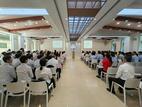In recent years, there has been considerable discussion among Christians about the reasons for the perceived decline in miracles. In the eyes of many, compared to the number of miracles God performed in rural churches when the gospel was first introduced to China, the occurrence of signs and wonders today is significantly fewer. However, there are also voices that completely contradict this view.
Recently, Reverend Wang, who has been pastoring in a city church in East China for many years, shared his perspective on the widely held belief that miracles have decreased. He argues that the notion of a decline in miracles is not factual, as many signs and wonders have occurred in the church he leads and serves. He attributes this to his strong emphasis on miracles in preaching.
Emphasizing miracles in sermons
Wang first shared several examples of miracles that occurred in his church:
A pastor, who had terminal esophageal cancer and could not even drink water, regained health after congregants fervently prayed for God's healing.
A Christian man, who had suffered from a skin disease for decades, was healed by God after his wife prayed persistently for two years, as she firmly believed in God's promise to heal her husband.
A sister in Christ, who had been diagnosed with severe depression and was told by doctors that she would need to be on medication for life, was able to stop taking medication after about a year of participating in church life and serving in the church healthily.
He stated, "Many people today stand at the pulpit and say, 'Don’t attach importance to miracles, but pursue God's Word.' This makes people feel that they shouldn't focus too much on signs and wonders. As a result, people don't pursue or emphasize miracles, which become fewer and fewer."
Unlike many pastors, Wang shared that while miracles are not the foremost aspect of faith, they will certainly accompany the proclamation of God's Word. Additionally, during every service and ministry, he often emphasized that "at this very moment, God is working in your life." He also reminds Christians that the God they believe in is a healing God who can heal any illness. Therefore, when encountering members who are sick, they continue to pray and ask for God's healing unless they know that God intends to bring someone home to heaven. Thus, believers build faith in God, rely more on God, and, encounter miracles because of their belief.
Regarding the perceived decline in miracles, Wang emphasized that ignoring signs and wonders in the sermon results in fewer miracles. When pastors emphasize not pursuing miracles during services, it creates many barriers to the occurrence of miracles.
In addition to this, he mentioned several other reasons for the perceived decline in miracles:
Misunderstanding the concept of miracles
"God is the God of miracles; God's presence is a miracle. Any work God does in us is a miracle, and the transformation of a person's life is also a miracle." However, some people mistakenly believe that only physical healing qualifies as a miracle.
He explained that God is a God who does new things, and His work is not uniform. From the Bible, we can see that sometimes Jesus healed physical diseases, sometimes He healed broken relationships, and sometimes He called disciples. Therefore, we should grant God absolute sovereignty in our service and worship, trusting in Him completely.
Lack of yearning and seeking God's guidance
When Moses led the Israelites in the wilderness, he sought God's guidance in everything. God's guidance was never interrupted, with miracles accompanying it. Therefore, the occurrence of miracles depends on a greater yearning for God, a willingness to submit to God, and a readiness to listen to His voice.
Some explain that the 400 years of God's silence between the Old and New Testaments was because the Israelites did not listen to God's words. This is similar to a parent stopping speaking, as a child never listens when the parent constantly talks to him.
Decreased dependence on God
"When we were young and poor, we couldn't afford medicine. So in many situations, we relied on God, seeking His healing through prayer. But now, with improved living standards, when people get sick, their first response is to buy medicine rather than pray. Some even stockpile medicine at home in case of emergencies. This doesn't mean you shouldn't take medicine or prepare in advance after getting sick; it's just that people's reliance on God has gradually decreased."
Incorrect miracles
Some people, who have gifts of praying for healing and achieving great results, are not engaged in building churches or evangelizing. As a result, after some time, their gifts diminish or even disappear, because God's purpose in healing is to establish His kingdom, not merely to heal.
Wang stated that the reason his church prays and asks for more miracles is to demonstrate God's power and glory, as well as to let people know that only God is the true God.
- Translated by Abigail Wu












